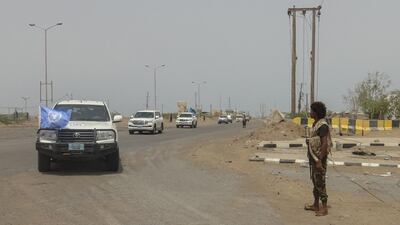A UN ceasefire monitoring team in Yemen's Red Sea port of Hodeidah has only one fifth of the 75 observers that the Security Council approved to take part almost four months ago.
A failure to grant visas is being blamed for the thin numbers in Hodeidah where the truce has not taken hold because of disputes over territory, a delayed replacement of forces as well as violations of the ceasefire itself.
Speaking on condition of anonymity diplomats and officials said administrative problems and bureaucracy is also hampering the deployment.
A UN official told The National that there are only 15 observers in Hodeidah and that 47 others are waiting on visas to enter the country and take up their roles.
“It's obviously not enough to monitor effectively,” said a diplomat who serves on the council.
A spokesman for UN Secretary General Antonio Guterres would not confirm the figures but he did not dispute them, noting that such numbers were “in flux”.
The ceasefire in Hodeidah was announced in December after peace talks in Sweden between Yemen's government and the country's Houthi rebels who control the strategic port as well as the capital Sanaa.
Both parties agreed to halt hostilities, withdraw their respective troops and fighters from Hodeidah's main port as well as two others in the province, and allow local security forces to take their place.
Hodeidah is the point of entry for most of Yemen's commercial goods and aid supplies and a cessation of violence was considered vital to speed up delivery of much needed food and medical supplies.
Fighting has reduced considerably but the plan has not been fully implemented because the Houthis have not pulled their forces out despite several times promising to do so. They repeated that pledge on Friday, according to the UN.
Lt Gen Michael Lollesgaard, head of the UN Mission to Support the Hodeidah Agreement (UNMHA), said in a statement that the Houthis had informed him of their “offer and intention to undertake an initial unilateral redeployment” from the ports of Hodeidah, Salif and Ras-Issa, starting on Saturday.
The UN will monitor and report on the redeployment which will be completed by Tuesday, according to the statement.
Lt Gen Lollesgaard chairs a Redeployment Coordination Committee comprising government and Houthi officials which was set up after the ceasefire agreement to make sure it went into effect.
“The RCC chair notes that this is a first practical step on the ground since the conclusion of the Hodeidah agreement, but stresses that it must be followed by the committed, transparent and sustained actions of the parties to fully deliver on their obligations,” the UN statement added.
The Security Council on January 16 approved UN Secretary General Antonio Guterres's request for 75 observers to be deployed to Hodeidah for six months. That resolution was meant to near quadruple the number of UN staff on the ground and ensure better enforcement of the ceasefire, yet the number has not risen.
In his proposal to the council Mr Guterres described the planned 75-strong team as “a nimble presence” to monitor compliance of the deal and establish and assess facts and conditions on the ground.
The Arab coalition that backs Yemen's government has documented more than 3,000 breaches of the ceasefire in Hodeidah and has called for the council to take action against the rebels.
Regarding the number of ceasefire monitors in Hodeidah, a spokesman for Mr Guterres would not give any numbers but said officials were “increasing their capacity in Hodeidah”.
“The mission is working with the parties to ensure appropriate administrative arrangements are in place to enable its deployment,” the spokesman said.
“This sees the regular and ongoing request for and issuance of travel authorisations for the movement of personnel in and out of the mission area. The mission looks forward to the continued cooperation of the parties in this regard.”
It is understood that the visas must be issued by the Houthis, rather than Yemen's internationally-recognised government, as they currently control the country's capital Sanaa, as well as Hodeidah.
The government is based in Yemen's other main city, Aden.
A source with knowledge of the UN mission in Yemen said multiple basic issues beyond getting in and out of the country had contributed to the slow pace of deployment, including getting the right people from member states to go there, agreeing their contracts and making sure they had somewhere to stay.
Martin Griffiths, the UN's special envoy to Yemen, is due to brief the council on Wednesday.

